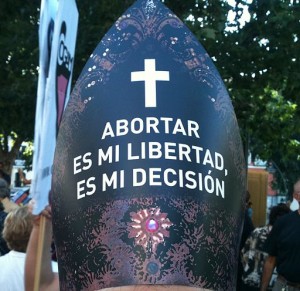Latin America’s Take on Abortion
Throughout the world, women’s rights advocates have advanced the decriminalization of abortion since the 20th century. After decades of debate all over globe, only seven countries still ban abortion under all circumstances. Many more countries allow abortion only on the grounds of saving the pregnant woman’s life (what is called therapeutic abortion) or in cases of rape and incest. In Latin America, most countries hold a similar premise on the issue of abortion, while five Latin American countries ban abortion altogether. The long history of Catholicism in the region has also played a major role in preventing Latin America from liberalizing its abortion legislation, despite well-formed groups of women’s rights advocates lobbying for a change in abortion laws.

A recent example is Peru, where many members of civil society have been advocating for a decriminalization of abortion in the cases of rape, even when the woman’s life is not threatened. Civil society organizations like PROMSEX, supported by Planned Parenthood, presented the case of a raped 13-year-old girl to the United Nations Committee on the Elimination of Discrimination Against Women (CEDAW), arguing that the Peruvian government had violated the girl’s rights in denying her an abortion even when her health was in danger. The UN’s efforts to make abortion more accessible to women in Peru yielded results last year when women’s reproductive rights organizations brought their case before the Commission on Congressional Constitution. Although pro-life views remain well-entrenched in Peruvian culture—particularly among supporters of the opposition party—the outrage caused by the recent cases of denied abortion has raised calls for legal reform throughout the nation.
A similar case occurred in Colombia where abortion was completely banned until the case of Marta Sulay in 2006. Currently, abortion in Colombia is legal when it is done to save the woman’s life and health, in the case of rape, and when the fetus is diagnosed to die at birth because of fetal abnormalities. Marta Sulay, who was pregnant with her fourth child, was diagnosed with cancer six weeks into the pregnancy, and while the court favored her desire to abort, by the time it did, it was too far late save Marta. Like many Latin American countries, Colombia has faced fervent opposition to legalize abortion from the Catholic Church, an institution deeply rooted in the region’s culture. Nonetheless, many members of the civil society in countries like Colombia and Peru have advocated for women’s rights, disregarding what is now seen by many as merely a conservative and prudish take on female reproductive health.
Contrary to the rest of the world, Latin America remains predominantly pro-life in its legislature. Two of the region’s most industrialized countries, Brazil and Mexico, only deem it legal for a woman to have an abortion in cases of rape and when the woman’s life is in danger. The influence of religion on Latin American politics is widespread, but especially visible in cases of controversial social issues like abortion. Historically, Latin America’s upper class has been the social group closest to the Catholic Church and most traditional in their beliefs. In practical terms, the upper classes have always had more resources and been more affluent, not having to withstand many of the hardships that the middle and lower classes face. Likewise, the working and middle class are usually the first to advocate for social change. The rise of Latin America’s middle class in Latin America and the global tendency of secularism may push many more women in the region to imitate their Peruvian counterparts and make their voices heard. Moreover, the dangers of back alley abortion, together with poverty and lack of access to proper healthcare will further press Latin American politics to a adopt a more progressive stance towards women’s rights.

